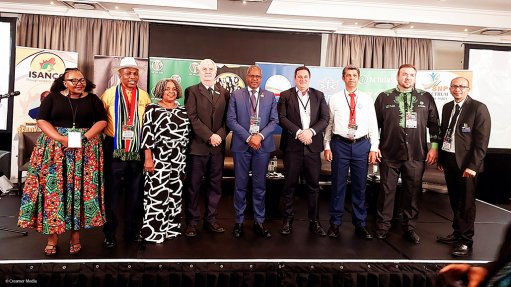
Multi-Party Charter leaders
ActionSA national chairperson Michael Beaumont said on Tuesday that societal change has never taken place by political actors alone, and has always included civil society, faith-based organisations, labour and business.
Beaumont was speaking during a media briefing by the Multi-Party Charter of South Africa, in which it welcomed talks with the Independent South African National Civic Organisation (Isanco).
The Multi-Party Charter consists of the Democratic Alliance (DA), ActionSA, Freedom Front Plus, Inkatha Freedom Party (IFP), African Christian Democratic Party, United Independent Movement and the Spectrum National Party.
Beaumont said South Africa was in trouble which was seeing political parties together with civil society organisations coming together despite differences to talk about change in the country.
He predicts that the African National Congress (ANC) will fall below 50% in next year's election.
“I think that is now common cause across South Africa, the only debate is how far below 50%, what permutations may arise from that; but certainly their majority will be lost is the fact that brings us all together,” he explained.
He highlighted that coalitions were the future of South Africa, despite noting that the experience around local government coalitions had not been a good one.
“And that is why these parties have come together long before an election, a historical first, and developed a pre-election agreement so that a coalition government which follows nationally or provincially can deliver better experiences for South Africans, with greater stability, and change, at the heart of its agenda,” he said.
Beaumont highlighted that the experience of getting political parties together with civil society organisations was exciting, particularly in a country whose government continued to “fail the good advice that is put to them by civil society”.
Isanco president Dr Zukile Luyenge noted that civil society movements "kept the fire burning" before 1994, under the banner of the United Democratic Front, until 1992.
FAILURES OF CHAPTER NINE INSTITUTIONS
However, he lashed out at the country’s institutions such as the Independent Electoral Commission of South Africa (IEC), the Office of the Public Protector and the Public Service Commission, saying they were strategically failing to exercise their powers because of “manipulation by the ruling party", the ANC, on all levels.
He said that politicians were "running in and out of courts" because of the “untrustworthy” IEC that was failing to process the filling of vacancies created by ward councillors or municipal managers.
He explained that Isanco was "oppressed" by not operating because the ANC was threatened by the party’s effect, saying failure to implement resolutions either by Parliament or legislatures continued unabated.
“Essentially the ANC government collapsed by being unable to keep lights on for the day, gender-based violence, brutal police killings and Minister’s fraud, while the State capture report remains stagnant,” he said.
WORKING IN PARTNERSHIP
IFP president Velenkosini Hlabisa highlighted that the party had signed on to the Multi-Party Charter because it recognises the power of working in partnership with people who are aligned with the IFP’s vision.
“We bring to the Charter a valuable facet: the IFP’s legacy of honest leadership. Our founder, the late President Emeritus Prince Mangosuthu Buthelezi was well known and well respected by all South Africans because he always acted with integrity,” he added.
Hlabisa discussed solutions for political change in South Africa and ensuring a transparent and consultative coalition in government, saying the IFP kept corruption out of government and dishonesty out of politics.
DA leader John Steenhuisen said that civil society organisations and political parties needed to come together to form a new "ecosystem of change" that was going to address challenges facing the country.
“Our enemy is not the ANC, they are our opponent, our enemy is poverty, our enemy is hunger that stalks our nation, our enemy is malnutrition that is starving our children to death, our enemy is the crime and criminality that stalks our country, our enemy is unemployment … And that is why we need to come together to form a new ecosystem of change that is going to address these challenges that for far too long have been allowed to fester in our beautiful country, and which are holding us back,” he said.